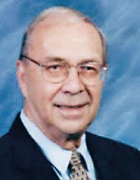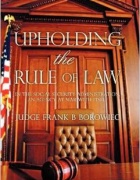Leadership Through Giving
A judge’s decision

When Hon. Frank A. Borowiec ’49 wrote a memoir about his years as a Social Security administrative judge, he opened the book with a quote from Albert Einstein. In part: “Everything is determined, the beginning as well as the end, by forces over which we have no control.”
He still considers it “miraculous” that Buffalo Law allowed him to enroll without an undergraduate degree. His undergraduate work at Hamilton College had been interrupted by World War II, in which he served in the Pacific as an Army meteorologist.
“Today if you don’t have an undergraduate degree, you can’t get close to law school,” Borowiec says. “It was a beautiful gesture on the part of the University. And if I had gone to law school a year or two later, a lot of good things in my life would not have occurred.” That includes serving as regional counsel for the United Steelworkers of America, in Buffalo, and then a long career as an administrative law judge with the Social Security Administration in Atlanta.

It was by design, though, that Borowiec decided to make a bequest of $50,000 to SUNY Buffalo Law School. “It’s an open-ended gift that’s intended as a thank-you,” he says. “Without that law degree I would not have been a judge, or an attorney for the steelworkers.”
His book, Upholding the Rule of Law: In the Social Security Administration, an Agency at War With Itself, takes the agency to task for denying such a large proportion of applications for disability benefits. He’s proud that his decisions to reverse the denial of benefits, though challenged by the agency, were upheld by appeals courts. Finally the Social Security Administrative Law Judge Corps sued the Social Security Administration, arguing that the agency was “interfering with our right to be fair and impartial.”
The lawsuit succeeded, and the American Bar Association recognized the achievement with a commendation citing the judges’ efforts “to protect the integrity of administrative adjudication within their agency, to preserve the public’s confidence in the fairness of governmental institutions, and to uphold the rule of law.”
The commendation now hangs on the wall of Borowiec’s study.
“These agencies are so big and so powerful, they tend to override the little people,” the judge says. “I tried to point out a basic unfairness.”